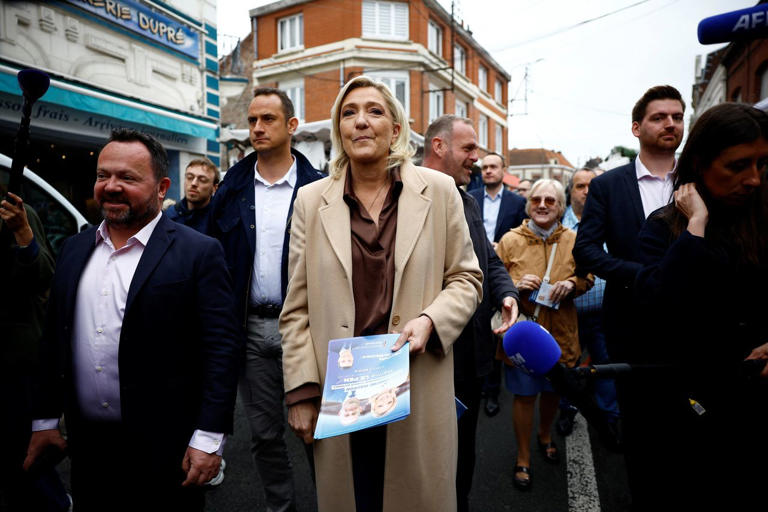Veterans of European Crises Experience Deja-Vu
European financial markets experienced turbulence last week after French President Emmanuel Macron called for snap parliamentary elections. The announcement led to a sell-off in European stock markets, a dip in the euro, and a notable rise in the yield on French government bonds. This increase pushed the spread over German yields to its highest level since 2017. The market’s reaction stems from fears that the far-right, euroskeptic National Rally (RN), led by Marine Le Pen, could gain significant power after recent successes against Macron’s centrist party in European Parliament elections.
Historical Context and Investor Concerns
Investors have been on high alert for anything that could threaten the stability of the European Union (EU) and its common currency, the euro, since the debt crisis that began in Greece in 2009. However, an RN victory would not necessarily pose an existential threat to the EU or the euro. While Europe’s far-right parties have edged closer to power, their goals have shifted from exiting the EU to reforming it from within. This shift reflects the resilience of the EU and the euro, contrary to the global retreat from supranational governance that began with Brexit and the election of Donald Trump in 2016.
Evolution of the National Rally
The National Rally, formerly known as the National Front, was founded in 1972 by Jean-Marie Le Pen. Initially characterized by anti-immigrant rhetoric and opposition to the EU and the euro, the party has since undergone significant changes. Marine Le Pen, who took over from her father in 2011 and later expelled him in 2015, has worked to make the party more palatable to mainstream voters while maintaining its core positions against immigration and the EU.
The Euro’s Survival and the Debt Crisis
The euro managed to survive the debt crisis due to its political popularity, which outweighed its economic flaws. Public fear of having savings redenominated into depreciating local currencies and the political and economic chaos of Brexit discouraged other countries from contemplating a similar exit. Marine Le Pen’s defeat to Macron in the 2017 presidential election was partly due to this public sentiment.
Inflation and Economic Policies
Recent inflation has further increased mistrust of monetary adventurism. Leaders skeptical of free markets, such as the presidents of Mexico and South Africa, have affirmed the independence of their central banks. Even in the United States, Trump may find it unpopular to interfere with the Federal Reserve’s independence.
Far-Right Parties’ Changing Stance on the EU
Far-right parties across Europe have softened their stance on leaving the EU. The RN’s candidate for prime minister, Jordan Bardella, has emphasized that their goal is not a French exit from the EU but to reform it from within. This mirrors the strategy of other far-right leaders, such as Geert Wilders in the Netherlands and Giorgia Meloni in Italy, who have adjusted their positions to align with broader EU policies and maintain political viability.
France’s Financial Fragility
France’s financial situation remains a critical concern. Last year, its budget deficit was the second largest in the eurozone, and its national debt was the third highest. The RN’s proposed policies, such as reducing the value-added tax on energy and reversing Macron’s pension reforms, could exacerbate these fiscal challenges. The European Commission has already flagged France for breaching the bloc’s deficit limits, which could lead to negotiations on fiscal remedies.
Constraints and Future Prospects
Despite their ambitions, the RN and other far-right parties are constrained by the realities of the euro. Rising French bond yields indicate investor concern about fiscal irresponsibility. The European Central Bank (ECB) has mechanisms to support bond yields of fiscally sound countries, but it might not extend this support to countries causing financial stress, such as France under an RN government. This scenario could force the RN to compromise with Brussels or face political instability.
Marine Le Pen and Jordan Bardella are aware of these constraints, which is why they have tempered their plans with the possibility of a public audit. While the far-right may seek a different path for Europe, their ability to diverge is limited if they wish to maintain the euro, a priority clearly supported by the electorate.
Conclusion
The resurgence of the far-right in Europe reflects shifting political dynamics, but the EU and the euro remain resilient institutions. The evolving strategies of far-right parties indicate a recognition of the constraints imposed by the common currency and the political landscape. While uncertainties persist, the stability of the EU and the euro appears more robust than in previous crises, offering a measure of confidence to investors and policymakers alike.
